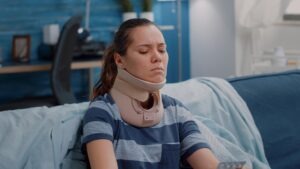
Fair compensation for pain and suffering depends on the factors of your case.
Insurance companies typically use one of the following methods to determine what they believe to be fair compensation for an injured person’s pain and suffering. Our team can help you determine if you are being adequately compensated.
The Multiplier Method to Calculate Fair Compensation for Pain and Suffering
Under the multiplier method, which is used more often than any other method to calculate pain and suffering compensation, the injured person’s economic damages (medical bills, lost wages, and other expenses) are totaled and then multiplied by a number, called a factor. The factor is between 1.5 and five.
Several elements are considered when determining the factor to use in an individual case. A person who recovers quickly from their injuries without residual impairment will likely receive a lower factor than someone with catastrophic wounds that change them for life. Of course, the at-fault party will argue that the court should use a lower multiplier, and the injured person will ask for a higher factor.
Contact Us For A Free Legal Consultation. No Fee.
Call (833) 55-FIGHTThe ‘Per Diem’ or Daily Rate Method for Calculating Fair Compensation for Pain and Suffering Damages
The per diem method is typically used in cases when the medical bills and other financial losses were nominal, but the injured person endured a great deal of pain and discomfort.
There are several ways to determine a per diem in an injury case. This method can be complex, but an attorney can help you determine what constitutes a fair settlement for pain and suffering.
Understanding Monetary Damages for Pain and Suffering
Damages for pain and suffering mean different things in different states. Generally, pain and suffering awards compensate injured people for their:
- Physical discomfort or pain
- Emotional trauma, distress, and anguish
- Inconvenience
The Legal Information Institute (LIII) explains that, in some states, “the term ‘pain and suffering’ includes all items of nonpecuniary damages and includes the loss of enjoyment of life. Damages for the loss of enjoyment of life compensate for the frustration and anguish caused by the inability to participate in activities that once brought pleasure.”
In many other states, however, pain and suffering damages focus on the injured person’s physical discomfort, emotional distress, and inconvenience. Other types of intangible losses, like disfigurement, a loss of enjoyment of life, and post-traumatic stress disorder (PTSD), are listed separately in the injury claim.
Our Team Can Help You Fight for Pain and Suffering and Other Damages
There are several types of damages you can seek after an accident. Here’s a quick overview of some damages we can pursue on your behalf in an injury case:
- Medical care. This is the reasonable cost of the medical treatment you needed for the wounds you suffered in the accident. Examples of recoverable medical expenses are ambulance services, emergency room care, diagnostic procedures, laboratory tests, blood transfusions, surgery, doctors, hospital, respiratory therapy, physical therapy, prescription drugs, and pain management.
- Lost earnings. If your injuries cause you to miss work, and you do not get paid the regular income during that time, the loss can be a part of the injury claim. This category can include the initial absence from work and unpaid time spent attending doctor’s appointments, physical therapy sessions, and other medical appointments.
- Future medical treatment. Some injuries leave a person in need of additional medical intervention, like follow-up surgeries and ongoing physical therapy. Our team will include all future medical treatments in your demand.
- Future lost income. This category is to compensate you if your injuries leave you unable to work. We can also fight for compensation if you are unable to work as many hours or if you need to take on a lower-paying job.
- Pain and suffering for the physical discomfort, inconvenience, and emotional distress of the accident and injuries.
- Other intangible losses, such as physical disfigurement, disability, loss of enjoyment of life, chronic depression and anxiety, and post-traumatic stress disorder (PTSD) from the accident.
Greenberg Gross Can Help You With Your Pain and Suffering Compensation Case
Greenberg Gross can help determine fair compensation for the pain and suffering you or a loved one endured. To get started, call us today. Let us fight for what you deserve.
Experienced Attorneys Who Will Listen And Fight For You
Speak To An Attorney Now »